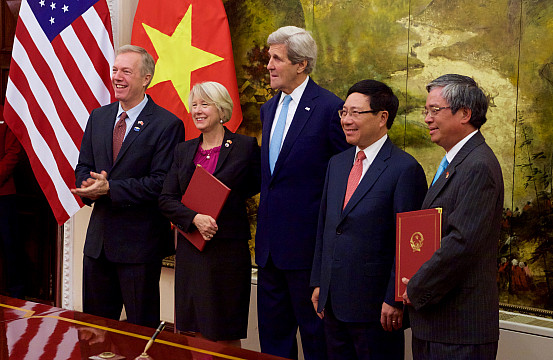 Vietnam has started 2017 by continuing the flurry of diplomatic activity that it undertook during much of 2016. It is all part of Vietnam’s multidirectional foreign policy, which emphasizes cultivating as many diverse relationships as possible while integrating further into the international political economy.
Vietnam has started 2017 by continuing the flurry of diplomatic activity that it undertook during much of 2016. It is all part of Vietnam’s multidirectional foreign policy, which emphasizes cultivating as many diverse relationships as possible while integrating further into the international political economy.
From January 12-15, Nguyen Phu Trong paid his first visit to China since his re-election as Party secretary-general in January last year. While there, he witnessed the signing of 15 cooperative agreements. The two countries issued a joint communiqué in which they agreed to “ manage their differences and safeguard peace in the South China Sea” while also noting the need to address the significant imbalance in trade. At the conclusion of the visit, Trong extended his invitation to Chinese President and Party Secretary Xi Jinping to visit Vietnam and attend the upcoming APEC summit being held in Vietnam.
While Trong was in China, John Kerry concluded his term as U. S. secretary of state by visiting Vietnam — a highly symbolic move. He re-visited the scene of his 1969 Silver Star Medal , where he met with a Viet Cong veteran who had known the Viet Cong soldier killed by Kerry. The outgoing secretary of state also met with Prime Minister Nguyen Xuan Phuc , who stated his optimism regarding the future of Vietnam-U. S. relations. He likewise extended an invitation to incoming President Donald Trump to visit Hanoi and attend the upcoming APEC summit. Although the success of the outgoing Obama administration’s “pivot to Asia” has been questioned, Vietnam has certainly been a focal point of that maneuver and Vietnam-U. S. relations have gone from strength to strength since the two countries signed a cooperative partnership in 2013.
Finally, on January 16, Japanese Prime Minister Shinzo Abe paid a visit to Vietnam as part of his six day Asia-Pacific tour. During the visit, Abe promised Vietnam six new patrol boats and stated his strong support for Vietnam’s enhancement of its maritime law enforcement capability. Tokyo and Hanoi similarly signed numerous business agreements as the two countries deepened defensive, economic, and political cooperation.






